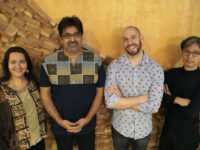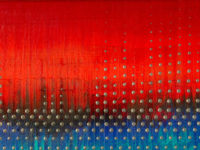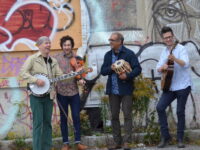Fareed Haque has become one difficult dude to ignore whenever you talk about fusion these days, including world fusion. He’s come up prominently in reviews of the latest by the Dixon-Rhyne Project and the jam band supergroup he helped to form, Garaj Mahal. Of Chilean and Pakistani descent, Haque is a complete master at both classical and jazz styles of guitar and teaches both at Northern Illinois University. Amongst the many projects he endeavors in, he also heads up his own group, which he calls The Flat Earth Ensemble.
Today brings the release of The Flat Earth Ensemble’s Flat Planet, from Owl Studios. On this record, Haque delves into combining Hindustani folk music and groove jazz. If you would guess that it’s not too far off from the exotic Asian flavored brand of fusion championed by Garaj Mahal, you’d be warm, but on the other hand it’s not warmed-over Garaj, either. The FEE dives head-first into Subcontinent sounds, as opposed to it being just a part of the myriad of styles put forth by Garaj Mahal. The idea of making sitar grooves isn’t new at all; the Dave Pike Set did this forty years ago. John McLaughlin also mined this vein from his Shakti days. But the Flat Earth Ensemble pushes out both the groove and the musicianship factors to intense levels.
Which brings us to the other distinguishing characteristic of Flat Earth: you also get more Fareed. A lot more Fareed. And since Fareed is such a diverse to virtuosic player of tremendous range, you don’t hear him repeat tricks too often. While the music is focused on achieving a particular hybrid, he’s tossing many the his facets of his playing style into this project.
To help bring forth Haque’s vision, The Flat Earth Ensemble is a mixture of Western and Indian instrumentation. David Hartsman provides sax and flute, Rob Clearfield and William Delisfort supply the keyboards, Alex Austin and John Paul handles bass and Cory Healey and Jason Smart man the drums. And then there’s the guys handling the Indian instruments: Subrata Bhattacharya, Jim Fieset and Salar Nader on tabla and Kalyan Pathak on dhol and sticked percussion. Additional guest musicians provide sitar, kanjira (a South Indian frame drum), Hindustani violin, djembe (a skin covered hand drum) and voice, via chants and konnakul, I’ll explain shortly.
“Big Bhangra” kicks off the album with a clearly defined purpose of combining the Hindustani with the jazzy groove. A konnakul kicks it off (percussive vocal scatting originating from Southern India) and soon, an infectious mid tempo strut powered by drums, tabla and kanjira underpin Haque’s jazz guitar and Delisfort’s funky electric piano. East meets West indeed. Never one to take himself too seriously, Fareed adds what he calls “silly vocals”at the end, but not before he puts down some seriously righteous licks.
“Uneven Mantra” gets its name from the unusual seven beat cycle, instead of the typical eight, with an interesting, extended melody. Clearfield is given plenty of room to stretch out on the piano before Haque produces a blazing classical guitar solo.
“Bengali Bud” comes the closest to being a pure Indian song, but even here the fusion goodness comes in the form of some exotic unison lines between Haque and sitar player Indrajit Banerjee. Banerjee and tabla player Subrata Bhattacharya both put in some amazing performances on their own, too.
On “Fur Peace,” Haque’s clean lines in the middle of this eleven minute track is textbook perfect. “32 Taxis” is a dreamy improvision Haque wrote over Ganesh Kumar’s kanjira played in 32 quarter note beats.
The whole proceedings end ambitiously with the three movements of the four part “Four Corners Suite,” a fifteen-minute whirlwind. (The fourth movement, “East” is available at all major download sites). The pensive “North” suite is a showcase for Hartsman’s flute and soprano sax, “South” is an avant-garde rock-jazz piece, and “West” settles into a more conventional hand-clapping vibe, where Haque lays down some bop phrases over a blues chord progression.
Even more so than Haque’s other band, Flat Planet is fusion that’s unique, stimulating and most importantly, fun. Save the tuition for Northern Illinois University and learn what Fareed Haque has to offer from soaking in this CD. You may not learn guitar this way (unless you’re ready for the really advanced stuff), but it’s a fine lesson in anthropology that you can actually groove to.
- Nick Millevoi – ‘Moon Pulses’ (2024) - April 23, 2024
- Cannonball Adderley – ‘Poppin’ in Paris: Live at L’Olympia 1972′ (2024) - April 20, 2024
- Christian Marien Quartett – ‘How Long Is Now’ (2024) - April 18, 2024





